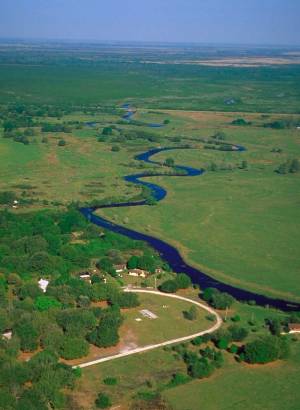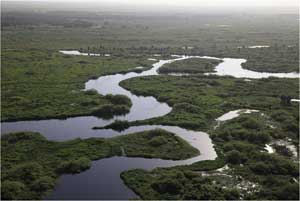
Located in Florida's Heartland, the Kissimmee River historically meandered 103 miles from Lake Kissimmee to Lake Okeechobee through a diversely rich 1-3 mile wide floodplain. During periods of heavy rains, the river would fill to capacity, sending the excess water into the river's floodplain. Waterfowl, largemouth bass, eagles, alligators, aquatic invertebrates and a mosaic of broadleaf plants thrived within the floodplain ecosystem. However, in 1947 prolonged flooding brought forth by hurricanes inundated the Kissimmee basin as well as the surrounding cities prompting citizens to cry out for flood control.

In 1948, the U.S. Congress authorized the U.S. Army Corps of Engineers (USACE) to construct the Central and South Florida Project. From 1960-1971, the Kissimmee River was transformed from a beautiful, meandering river into a 56-mile-long ditch – 300 feet wide and 30 feet deep – known as the C-38 canal. In addition, six water control structures were created to manage flooding within the central Florida basin. As a result of this ditch-and-drain effort, the wetland-dependent flora and fauna that once thrived in the Kissimmee system declined drastically. Studies showed a 90% decrease in waterfowl and a 70% decrease in Bald Eagle populations. Replacing the once popular largemouth bass fisheries were fish species that were more tolerant of a system lower in dissolved oxygen.

In 1992 after years of research, the Kissimmee River Restoration Water Resources Development Act was authorized that allocated funding to restore the middle third of the channelized Kissimmee River. The Kissimmee River Restoration (KKR) is a 50/50 cost share project between the US Army Corps of Engineers (COE) and the South Florida Water Management District (SFWMD). The SFWMD provides the state’s funding and is responsible for the land acquisition, the biological monitoring and education in partnership with CES at Riverwoods. For more information about the SFWMD’s role in the KRR check online:
https://www.sfwmd.gov/our-work/kissimmee-river
The COE provides the federal funding and is in charge of the construction contracts. Check the COE’s KRR fact sheet online: https://usace.contentdm.oclc.org/utils/getfile/collection/p16021coll11/id/4248
The restoration methodology used is backfilling the C-38 canal to restore the flow and function to the historic river that became stagnant and lifeless due to low oxygen conditions. The river is being restored in 4 construction phases. The COE and the SFWMD work closely using adaptive management strategies to ensure the restoration meets it’s goals. The SFWMD scientists set up a Performance Evaluation Program that consist of 25 performance measures that evaluate every component of the restoration including – hydrology, water quality, geomorphology, vegetation, and bird, fish, amphibian, reptile and invertebrate communities. Scientists have found that the flora and fauna that disappeared when the river was a canal have returned and are thriving in the newly restored system. Scientific data indicates that restoration is meeting or exceeding the expectations set up at the beginning of the project!
For more information about the SFWMD’s Kissimmee River Restoration history check online: https://www.sfwmd.gov/our-work/kissimmee-river